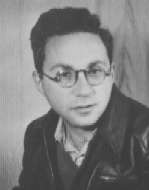Richman, Menachem (Monia)
Son of Leah and Eliahu, was born on April 9, 1924 in the city of Rowna, Poland, and immigrated to Israel with his parents and brother Yaakov (Shura) in 1935. Menahem first attended the “Ahad Ha’am” elementary school in Tel Aviv , And after completing his studies in 1939 he moved to the High School of Commerce, which he completed in 1942. After a while, he completed his full year of service in the Haganah (1943-1944) He served in the Guard of the Homeland until 1945. In 1945, he was admitted to the Levinsky Teachers ‘and Teachers’ Seminary in Tel- Aviv University, and after one year of study he was required to leave And in 1946 he was admitted to the Hebrew University of Jerusalem, where he studied literature and history until the outbreak of the War of Independence, and in 1947 he was appointed commander of a platoon in Jerusalem. “Michmas” – one of the two infantry battalions that was then established in Jerusalem. In December 1947, he commanded a unit in the battles for the Jewish Quarter in the Old City, and he excelled with exemplary courage when he threw a grenade with an open shot that had been dropped by one of the defenders who was critically wounded. In January 1948 he was sent to Gush Etzion at the head of his company, which fought for the defense of the bloc and managed to repel the first major attack on the bloc. From there he was brought back to Jerusalem and participated in a long line of battles on the Jerusalem front, the outlet, Erez, the railway station, the government printing press, the Allenby camp and Mount Zion. Menahem fell in battle for Ramat Rachel on May 22, 1948, when he was on his way to command the kibbutz. An enemy shell hit the armored vehicle, and in its last moments he said to a friend who had come to his aid: “Leave me alone, you have another job now.” Menachem was buried in the temporary cemetery in Sheikh Bader (next to the current Knesset Hill) and on the 10th of Elul 5710 (September 10, 1950) he was transferred to the eternal military cemetery at Mount Herzl in Jerusalem. After he fell, he was awarded the rank of captain and was recommended to receive two citations – one for his part in the Etzion Bloc and the other for his part in the battles in Jerusalem – Menahem excelled in character and character traits, as a person, as a friend and commander. “A tough nut to crack” – he defined himself, and yet self-critical, trying to clarify and whiten to himself, by looking internally at the sources, reasons and essence of his soul’s reactions His main purpose was to be an educator and to devote himself to educating himself to be an influential educator on his future students. He was especially active in educating street children and youth, and was very active in organizing the “Youth of the Suburbs” in the framework of the Haganah: he was going to collect and assemble them one by one to create an organization. He was one of the many programs he had aspired to achieve in a life he loved so much, in all his actions he fought for the weakness of himself and others, hated compromises and followed the voice of conscience and inner consciousness. . He always went to the top of his men, was with them and took care of them. His personal behavior served as an example for his students and subordinates and taught them to resist temptations and weaknesses and adapt to difficult conditions. “Little Ritzi” – as they called him – was respected and loved by all his men and had great influence over them. In 1996 a book was publishedMenachem in the name of “Alumim in the Shadow of the Storm”, which includes a selection of his diaries and letters. The book was published by his brother, Yaakov Nitzan, through the Defense Ministry’s publishing house. In 2002, his brother, Yaakov Nitzan, erected a monument in memory of Menahem at Kibbutz Ramat Rachel near the house of Boyko, the house to which he directed the remnants of his unit in order to find hiding from enemy shelling in Tire-Baher.
